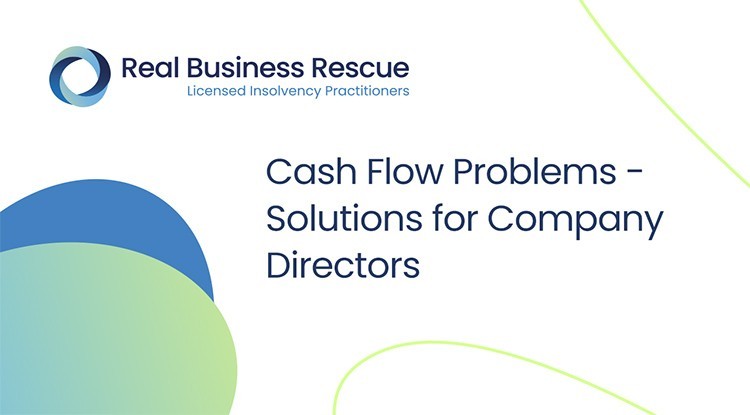
Understand your company's position and learn more about the options available
Require Immediate Support? Free Director Helpline: 0800 644 6080
Free Director Helpline: 0800 644 6080
Updated:
When a company begins experiencing cash flow issues, the situation can quickly escalate, leaving the business unable to pay its liabilities and other overheads as and when they fall due. When this happens, the company can be said to be cash flow insolvent and swift action needs to be taken to rectify the situation.
Cash flow problems arise when a company has more money going out than it has coming in. While temporary cash flow problems are not uncommon over the life cycle of a business, if the situation is left to continue without remedial action being taken, the company's position can quickly deteriorate.
Business cash flow problems open the door to a number of other issues which can lead to legal action and formal insolvency proceedings being commenced against the company.
A company is insolvent when it becomes unable to meet its financial liabilities as and when they fall due, and although this is not necessarily the same as having cash flow problems, there is usually a close connection between the two.
There could be a number of reasons why a business has a deficit in available funds and is experiencing squeezed cash flow. Usually the sources of cash flow problems can be categorised into three main areas:

Get a Quote Find Your Nearest Office
A problem with a limited company's cash flow can occur from a number of different events, some of which are beyond the control of the company. Being unable to keep up with repayments on any of the following should be taken as a warning sign that your cash flow is compromised:
You’ll need to be honest with yourself and face up to figures in front of you - your cash flow issues may be just a temporary problem that can easily be resolved, but also consider whether you’ve been in denial and there are serious underlying issues which will take radical steps to rescue the business in order to save the company from closure.
Once a company begins experiencing cash flow problems the biggest worry for directors is being faced with a winding up petition by creditors which means your company may potentially be a matter of days away from compulsory liquidation.
Free 60 Second Test
For Ltd Company Directors
What are you looking to do?
Choose below:
There are several different ways in which cash flow may be improved, such as by increasing income, improving profit margins or by reducing the debt repayments to creditors through formal or informal negotiations.
If you're unable to increase income despite your best efforts and you can't afford to pay your bills and debts as and when they fall due, then the only remaining option for rescuing your business from insolvency is to approach your creditors and HMRC with some type of payment plan proposal to begin the route to recovery.

Once a company begins experiencing cash flow problems the biggest worry for directors is being faced with a winding up petition. It may be just a temporary problem that can easily be resolved, but the underlying issues could be serious which will require more formal restructuring help. Business cash flow problems open the door for a great number of other issues which can lead to formal insolvency proceedings unless you seek help from professional insolvency specialists at the very first warning signs.
“I completed the simple on line form, received the free guide by email immediately and then a call from Tom who was so very helpful. Highly recommend this service”
Pauline Whitehead
If you believe your company's cash flow problems may be leaving it at risk of becoming insolvent, you should make it a priority to talk to an insolvency practitioner as a matter of urgency to understand what options you have for dealing with your creditors.
Is your company insolvent?
If your company is insolvent you have a number of legal responsibilities that you must adhere to. Taking steps to protect creditors from further losses by contacting a licensed insolvency practitioner can help ensure you adhere to these duties.
The team are available now - 0800 644 6080
Whether we need to help restructure your business, help you obtain financing or set up a Company Voluntary Arrangement with creditors, there is an answer to your cash flow worries.
When advising how to avoid cash flow problems and the consequences of having no working capital, we may suggest entering into an invoice finance arrangement if you have a surplus of uncollected debts from your customers. On the other hand, your company may need to undergo a process of restructuring in order to streamline operations and improve efficiencies across the business. This can be done via administration
Our ultimate goal here at Real Business Rescue is to find a means to help your company survive financial distress and period of cash flow problems. With 100+ offices across the UK, you’re never far away from expert and confidential advice. Call our team for immediate help and advice.
Still unsure whether liquidation is right for your company? Don't worry, the experts at Real Business Rescue are here to help. Our licensed insolvency practitioners will take the time to understand the problems your company is facing before recommending the best course of action going forward based on your own unique circumstances.

Complete the below to get in touch
For Ltd Company Directors
What are you looking to do?
Choose below:
We provide free confidential advice with absolutely no obligation.
Our expert and non-judgemental team are ready to assist directors and stakeholders today.

Understand your company's position and learn more about the options available

Find your nearest office - we have more than 100 across the UK. Remote Video Meetings are also available.

Free, confidential, and trusted advice for company directors across the UK.